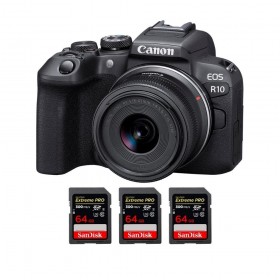
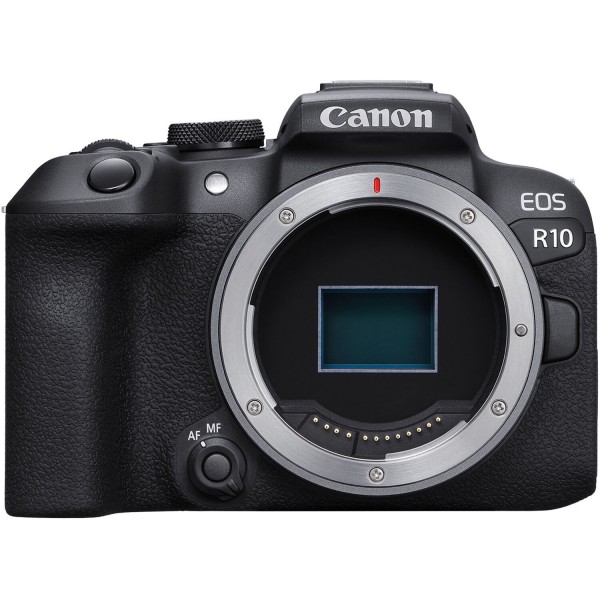






Canon EOS R10 Body Only - APS-C Mirrorless Camera

The Canon EOS R10 mirrorless camera is a great all-round choice with a 24.2-megapixel APS-C sensor, oversampled 4K/30p video, automatic subject detection and up to 30fps RAW burst mode for AF tracking.
FREE SHIPPING
Tracked and secured within 6/15 days
FINAL PRICE
Nothing to pay on delivery
100% BRAND NEW
3 years warranty
EASY RETURNS
Returns possible for 14 days
The Canon EOS R10 is a mirrorless camera with an APS-C sensor. It is the successor to the Canon EOS 90D SLR. It is the successor to the Canon EOS 90D, and it has a smaller and more balanced spec sheet than its predecessors.
The EOS R10 , which is the lightest of all Canon's APS-C mirrorless cameras, claims to be the company's lightest body in any mount (except the EOS M). It claims to be 20g lighter than the "small" Canon EOS 250D DSLR, which weighs 429 grams. It measures 12.3cm wide by 8.7cm long and is particularly tiny, fitting naturally into any camera bag.
In terms of positioning, it is aimed primarily at seasoned amateurs, both in photography and video. In fact, it follows the continuity of Canon SLRs whose total number is higher than 2 digits. It is said to be consistent with the EOS 90D, which was presented in 2019 by Canon.
So this is not a model for beginners, which leaves the door open for a cheaper (and hypothetical) hybrid in the future.
 %20EOS% 20R10/Canon-eos-10-photo-example.jpg" alt="Canon eos R10 photo example" width="900" height="600" />
%20EOS% 20R10/Canon-eos-10-photo-example.jpg" alt="Canon eos R10 photo example" width="900" height="600" />
One of the first two APS-C hybrids with an RF mount.
The Canon EOS R10 is compatible with all full-frame mirrorless lenses (RF mount), with a 1.6x crop factor (as with EF and EF-S mount DSLRs).
When attached to the EOS R10, a 50mm lens provides a field of view equivalent to 80mm.
The Canon EOS R7 is, however, compatible with a wide range of EF and EF-S mount lenses, via the EF-RF adapter ring.
Finally, the RF-S complete the evolution of the EOS family lens range. They are compatible with Canon's full-frame mirrorless cameras (de facto enabling APS-C mode on the camera).

Excellent ergonomics
The design of the Canon EOS R10 APSC hybrid is similar to that of its predecessors. The body is ultra-compact, with rounded lines that facilitate handling. Of course, the RF mount is visible here, since it has a diameter of 54 mm.
We appreciate the return of a traditional rear joystick, located under the thumb and integrated into the handlebar. The rotating screen, which is mounted on a ball joint and can be adjusted for framing at ground level or at arm's length in photo or video, is also very useful. We appreciate that there is a "real" rear control, under the thumb.
Around the depth of field simulation button, you'll notice the arrival of a new focus switch (AF/MF), so Canon no longer needs to integrate it into its lenses.
Finally, we'll cover the new multi-function accessory shoe (borrowed from the EOS R5C and the Canon EOS R3 ), as well as a tiny pop-up flash. For the first time in an EOS R camera!

24.2 MP unstabilized sensor
The Canon EOS R10 's sensor is a 24.2MP APS-C sensor. It's similar to the one in the EOS 80D, but Canon promises it's been upgraded with new micro lenses to improve image quality. The RF mount's huge diameter makes the sensor look tiny.
The EOS R10 's sensor is not stabilized, unlike the EOS R7. Obviously, if you frequently shoot in low light, the lack of sensor stabilization (IBIS) can be problematic (unlike the EOS R7).
The EOS R10's sensor is linked to the Digic X chip, which has already been used in other cameras (EOS R6, R5, R5C and R3). A sensitivity of 100 to 32,000 ISO (expandable to 51,200 ISO) is available.

Up to 23 frames per second in burst mode and dual pixel autofocus
The EOS R10's performance hasn't been reduced, although the body has been simplified. It benefits from Dual Pixel CMOS AF II autofocus, previously found on Canon cameras.
It also takes advantage of the new sophisticated autofocus modes, like on the EOS R7. The camera is able to identify a person's face and eye, as well as the face and eye of animals (dogs, cats and birds). It can also identify motorcyclists' helmets with ease.
The EOS R7 and R10 have the same level of autofocus... with one exception. Indeed, the AF sensitivity of the EOS R10 is slightly lower in low light (-4 EV vs. -5 EV).
The Canon EOS R10 APSC hybrid can shoot up to 15 frames per second with a mechanical shutter. It can also capture footage at a rate of 23 frames per second with the electronic shutter.
That's a bit slower than the EOS R7, which can boast a frame rate of 30fps (and no blackouts). Still, it's impressive performance and should make amateur sports photographers happy.
In terms of buffer memory, there are 460 JPEG and 29 RAW (mechanical shutter), as well as 70 JPEG and 21 RAW (electronic shutter). The burst speed is undoubtedly astounding... but the bursts themselves won't last long.
Finally, keep in mind that the Canon EOS R10 can "only" do 1/4000s (in mechanical shutter), while the EOS R7 can reach up to 1/8000s. Both cameras are however capable of reaching speeds of at least 1/16000s.

4K 30p without cropping
Canon has equipped its EOS R10 with the right video features to help photographers who (also) want to get started with video. The camera is thus capable of filming in 4K UHD at 30 fps without cropping. The same can be said of a camera like the EOS RP!
The Canon R10 can capture 4K 60P footage, which is fantastic for creating slow-motion videos. However, this comes at the cost of some image clipping (x1.56). Note that Full HD shooting at 120fps is also possible.
HDR PQ image quality mode is also available. The device can take photos in JPEG and RAW formats.
Finally, you can record for up to 2 hours. This is ideal for recording interviews, for example. You'll need to upgrade to the EOS R7 if you want to record for longer than that.
If the camera doesn't have sensor stabilization, it does have a two-level software stabilization effect. The crop produced by the latter is designated by a specific percentage (10% or 30%). Canon wants to reassure on this point, saying that many RF-S lenses will be stabilized.

A well-integrated connection
The Canon EOS R10 only has a single SD card slot for backing up your photos. It's compatible with UHS-II cards, which is a good thing. So if you want dual SD card slots, you'll have to look elsewhere.
The EOS R10 is pretty well equipped when it comes to connectivity. A USB Type-C port, which allows you to charge the camera's battery when it's off. This is a bit of a cheat from Canon: instead of being a USB 3 port, it's a USB 2.0 port. To move your photos, you'll have to use the "traditional" approach and remove the SD card from the body yourself.
This model has an HDMI output (type D) and a microphone jack (3.5 mm jack), as well as an RS-60E3 remote control jack. However, it does not have a headphone jack.
In terms of wireless technology, the EOS R10 comes with Wi-Fi (2.4GHz) and Bluetooth 4.2. Finally, Canon made an announcement about a future RAW image processing feature on the Cloud, which should be available later this year.
The Canon LP-E17 battery was used for the EOS R10. If you already own a Canon EF-M mirrorless camera (EOS M3, M6 Mark II, or M50...) or a Canon APS-C SLR camera (EOS 77D, EOS 800D, etc.), you can reuse your stock of batteries without restriction. The same charger (LP-E17E) is also included in the box
In terms of control, Canon promises 430 JPEG photos with the LCD screen and 260 JPEG photos with the viewfinder. Values that are lower than those of the EOS R7... We will have to test it in the field to see if they are accurate.
Finally, we note that Canon does not plan to provide a grip with the EOS R10, at least not yet.

What we like about the Canon EOS R10
- Ultra-lightweight APSC camera with hybrid capabilities, ideal for anyone considering a mirrorless system.
- 24.2 megapixel photos and stunning 4K/30p oversampled video plus slow motion up to 120p in Full HD.
- The fast DIGIC X processor works with cutting-edge Dual Pixel CMOS AF II with AI subject recognition.
- Shoot at surprisingly fast frame rates, up to 15 frames per second in mechanical shutter mode or 23 frames per second with the electronic shutter.
- Attach a wide range of lenses, from full-frame RF mirrorless lenses to new RF-S lenses and even EF DSLRs with an adapter.

Does the Canon R10 have image stabilization?
One of the main features of the Canon R10 mirrorless camera is the lack of a sensor-based image stabilization system.
Instead, the R10 uses a unique lens-based stabilization system that is compatible with 21 existing Canon lenses.
This system allows the device to take clear photos and videos even in low light and shaking conditions.
Therefore, the Canon EOS R10 is an excellent choice for photographers and videographers who need a reliable camera capable of producing high-quality images and videos.

Is the Canon EOS R10 weather sealed?
The Canon EOS R10 is an APSC camera that was released in 2022. It has a 24.2 megapixel sensor and is capable of shooting 4K video.
One of its main features is its lack of environmental seals.
This means that the Canon APSC sensor camera is more susceptible to damage from water and dust than other digital cameras on the market.
For this reason, it is important to take care when using the Canon R10 and protect it from the elements. There are a number of accessories that can help you do this, such as carrying cases and rain covers.
By taking a few simple precautions, you can ensure that your Canon R10 stays safe and dry, whatever the weather conditions.

What is the maximum ISO sensitivity of the Canon R10?
The Canon R10 is a high-performance camera that offers excellent image quality and excellent shooting capabilities.
It features a 24.0MP APS-C CMOS sensor and the latest Digic X processor. This gives it the ability to shoot at very high resolutions, up to 6000 x 4000 pixels.
1:1, 4:3, 3:2 and 16:9 aspect ratios are all available, giving you plenty of options for your photos.
The native ISO range of 100-32000 can be increased to 100-51200, giving you even more flexibility in low-light situations.
The EOS R10 also has the ability to record files in RAW format, giving you more post-processing options.
While it's not the highest-resolution APS-C camera on the market, the Canon R10 is a very capable camera that should meet the needs of most photographers.

What is the maximum continuous shooting speed (fps) of the Canon EOS R10?
The Canon EOS R10 has a maximum continuous shooting speed of 15.0 fps.
That's 5.9fps faster than the average shooting speed for mirrorless cameras, making it ideal for sports photography or any other situation where the scene is changing quickly.
With a maximum ISO sensitivity of 51200, it can also shoot in low light conditions without sacrificing image quality.
Additionally, the Canon EOS R10 features a vari-angle LCD screen that makes it easy to capture high-quality photos and videos from any angle.
As a result, the Canon EOS R10 is a versatile and powerful camera that will certainly meet the needs of even the most demanding photographers.

How much does the Canon EOS R10 APSC camera weigh?
The Canon EOS R10 is a new addition to the company's mirrorless camera lineup.
Weighing in at 426g, it's slightly lighter than the average camera in its class.
The EOS R10 also has external dimensions of 122.5 x 87.8 x 83.4mm, making it slightly thicker than the average camera.
However, this extra thickness does not seem to affect the overall performance of the device.
In fact, the R10's extra padding can even help protect it from bumps and bruises.
Overall, the Canon R10 is a solid entry into the mirrorless camera market. Its weight and dimensions are about average, and the extra padding can help protect it.

Our opinion on the APSC hybrid Canon EOS R10
Before the introduction of the Canon EOS R10, all previous mirrorless cameras were built around a full-frame sensor. This substantial change allows photographers and video producers to carry significantly less gear with smaller lenses that offer even greater telephoto reach than a full-frame camera.
The EOS R10 is packed with cutting-edge technology to help you get the shot you want or the movie scene you’ve been waiting for. Canon’s sophisticated Dual Pixel CMOS AF II can track a variety of subjects, including people, animals and automobiles. This keeps subjects in focus no matter where they are in the frame, at shooting speeds of up to 15fps in mechanical mode and 30fps with a sensor crop, or 23fps using the full sensor powered by the cutting-edge DIGIC X processor.
With nearly unlimited lens options, from APS-C format RF-S lenses to full-frame RF lenses and even DSLR lenses using a conversion adapter, you can create an unbeatable system to expand your expertise and produce stunning images, 4K movies, slow-motion content, panoramas and virtually anything else.
Data sheet
- Sensor Resolution (Millions of pixels)
- 24.2 Megapixel
- Camera Format
- APS-C
- Memory card
- SD/SDHC/SDXC (UHS-II)
- Weight
- 429g
10 other products in the same category:


Canon EOS R10 + RF 100-400mm F5.6-8 IS USM...
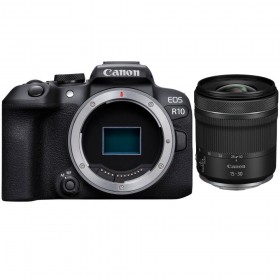
Canon EOS R10 + RF 15-30mm F4.5-6.3 IS STM...
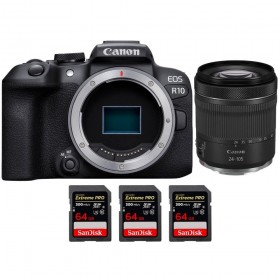
Canon EOS R10 + RF 24-105mm F4-7.1 IS STM...

Canon EOS R10 + RF 85mm F2 Macro IS STM -...
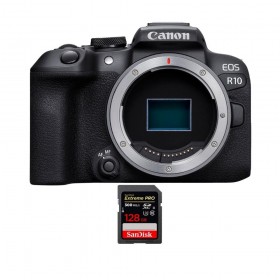
Canon EOS R10 + 1 SanDisk 128GB Extreme...

Canon EOS R10 + RF 24-240mm F4-6.3 IS USM...

Canon EOS R10 + RF 100-400mm F5.6-8 IS USM...
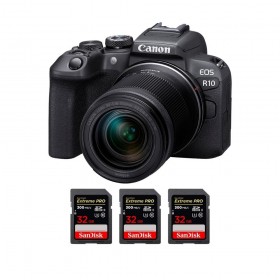
Canon EOS R10 + RF-S 18-150mm F4.5-6.3 IS...
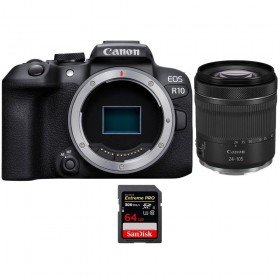
Canon EOS R10 + RF 24-105mm F4-7.1 IS STM...
Product Reviews / Q&A
-
Reviews (0)
-
Questions & Answers (0)
-
Latest
-
Latest








